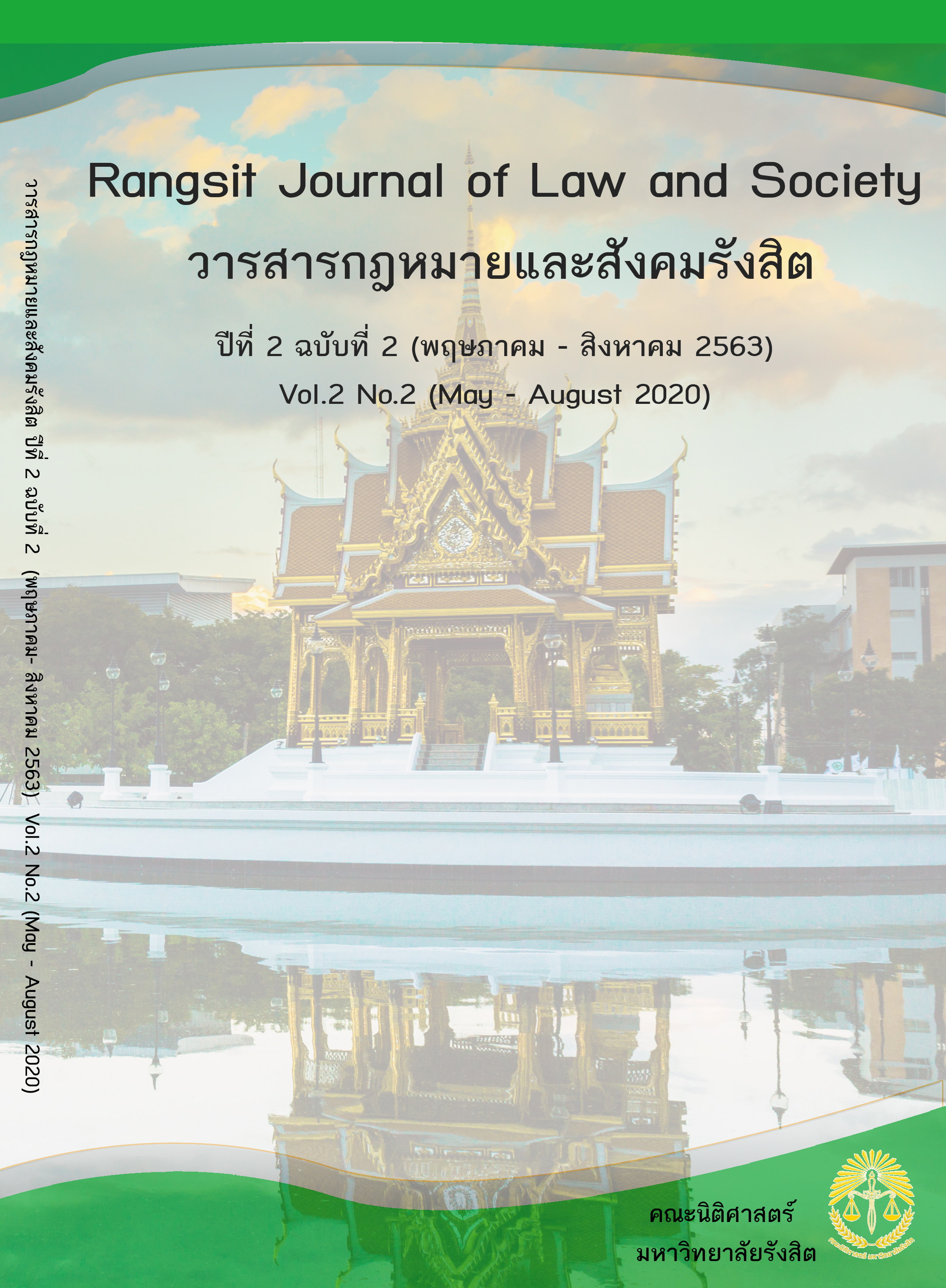อายุความในการกล่าวหาเจ้าหน้าที่รัฐในคดีทุจริต
Main Article Content
บทคัดย่อ
บทความวิชาการนี้เขียนขึ้นมีวัตถุประสงค์เพื่อศึกษาปัญหาและวิเคราะห์แนวทางในการแก้ไขเกี่ยวกับกรณีการกำหนดระยะเวลาในการกล่าวหาเจ้าหน้าที่รัฐตามพระบัญญัติมาตรการของฝ่ายบริหารในการป้องกันและปราบปรามการทุจริต พ.ศ.2551 อันเป็นเงื่อนไขสำคัญในการพิจารณาในการรับเรื่องร้องเรียนถึงการกระทำความผิด เมื่อวิเคราะห์บทกฎหมายโดยเชิงลึกพบว่า การกำหนดระยะเวลาเพียง 5 ปี นับแต่วันเกิดเหตุจนถึงวันกล่าวหาเป็นระยะเวลาที่ไม่เพียงพอและไม่ได้สัดส่วนกับพฤติการณ์ในความเป็นจริง เนื่องจากมีหลายปัจจัยอันเป็นสาเหตุที่ก่อให้เกิดความล่าช้าในการรวบรวมพยานหลักฐานเพื่อให้เพียงพอต่อการพิสูจน์ความผิด อาทิเช่น ในปัจจุบันกระบวนการทุจริตมีการใช้เทคโนโลยีในการเอื้ออำนวย ไม่ว่าจะเป็นการรับส่งข้อมูล การเก็บรักษาข้อมูลที่มีความซับซ้อนมากยิ่งขึ้น หรือการทุจริตโดยเจ้าหน้าที่รัฐที่มีตำแหน่งระดับสูงหรือผู้มีอิทธิพลให้การช่วยเหลือ นอกจากนี้การทุจริตที่มีกระบวนการระหว่างประเทศ การจะทราบถึงผู้กระทำความผิดจึงเป็นไปได้ยาก ด้วยเหตุนี้จึงก่อให้เกิดความไม่เป็นธรรมต่อบุคคลที่ปฏิบัติตามระเบียบอย่างถูกต้อง และเมื่อศึกษาเปรียบเทียบกับอนุสัญญาสหประชาชาติว่าด้วยการต่อต้านการทุจริต ค.ศ.2003 ที่ประเทศไทยเราได้มีการลงนามร่วมเป็นภาคีอนุสัญญา ทำให้พบว่าการตราบทกฎหมายดังกล่าวเกิดความไม่สอดคล้องกับอนุสัญญาที่มีการกำหนดมาตรฐานระดับสากลไว้ และเมื่อเทียบเคียงบทกฎหมายต่างประเทศที่มีลักษณะเดียวกัน ได้แก่ สาธารณรัฐฝรั่งเศสและสาธารณรัฐประชาธิปไตยประชาชนจีน จะเห็นว่าบทกฎหมายต่างประเทศมีการกำหนดระยะเวลาในการร้องเรียนที่ยาวนานและเหมาะสมกับพฤติการณ์ความร้ายแรง ส่งผลให้ผู้กระทำความผิดมิอาจหลุดพ้นจากการถูกลงโทษตามกฎหมาย
Article Details

อนุญาตภายใต้เงื่อนไข Creative Commons Attribution-NonCommercial-NoDerivatives 4.0 International License.
เอกสารอ้างอิง
แสวง บุญเฉลิมวิภาส และคณะ. (2551). การศึกษาพันธกรณีและความพร้อมของประเทศไทยในการปฏิบัติตามอนุสัญญาสหประชาชาติว่าด้วยการต่อต้านการทุจริต ค.ศ.2003. ใน รายงานวิจัย มหาวิทยาลัยธรรมศาสตร์. กรุงเทพมหานคร: สำนักงานคณะกรรมการป้องกันและปราบปรามการทุจริตแห่งชาติ.
ธารทิพย์ ภูเดช. (2558). บทบาทของเจ้าพนักงานในการป้องกันและปราบปรามการทุจริต . ใน วิทยานิพนธ์นิติศาสตร์มหาบัณฑิต. กรุงเทพมหานคร: มหาวิทยาลัยธุรกิจบัณฑิตย์.
ปวีณา กุวานนท์. (2552). มารู้จักกระทรวงตรวจสอบแห่งสาธารณรัฐประชาชนจีนกันเถอะ. เข้าถึงได้จาก http://203.114.122.85/download/Journals/ebook52_2-6.pdf
ภูริชญา วัฒนรุ่ง. (2547). การทุจริตคอรัปชั่นและการป้องกันและปราบปรามการทุจริตในวงราชการ. กรุงเทพมหานคร: สำนักงานคณะกรรมการศาลฎีกา.
สํานักงานเลขาธิการสภาผู้แทนราษฎร. (2560). สาธารณรัฐประชาชนจีนกับการป้องกันและปราบปรามการทุจริต. เข้าถึงได้จาก http://www.ccdi.gov.cn/xxgk/ldjg/hsx/
สำนักงานคณะกรรมการป้องกันและปราบปรามการทุจริตในภาครัฐ. (2551). พระราชบัญญัติมาตรการของฝ่ายบริหารในการป้องกันและปราบปรามการทุจริตในภาครัฐ พ.ศ. 2551. เข้าถึงได้จาก https://www.pacc.go.th/index.php/home/index
สำนักงานอัยการสูงสุด. (2552). การเปรียบเทียบอายุความของกฎหมายต่างประเทศ. กรุงเทพมหานคร: สำนักอัยการสูงสุด.
สิฐสร กระแสร์สุนทร. (2562). การส่งเสริมและพัฒนาการดำเนินงานด้านคุณธรรมจริยธรรมของสำนักงานเลขาธิการสภาผู้แทนราษฎร: กรณีศึกษาการส่งเสริมและพัฒนาการประพฤติปฏิบัติตนของข้าราชการให้สอดรับกับค่านิยมองค์กรและพันธะสัญญาด้านการต่อต้านการทุจริต. ใน กลุ่มงานวิจัยและพัฒนา สำนักวิชาการ. กรุงเทพมหานคร: สำนักงานเลขาธิการสภาผู้แทนราษฎร.

